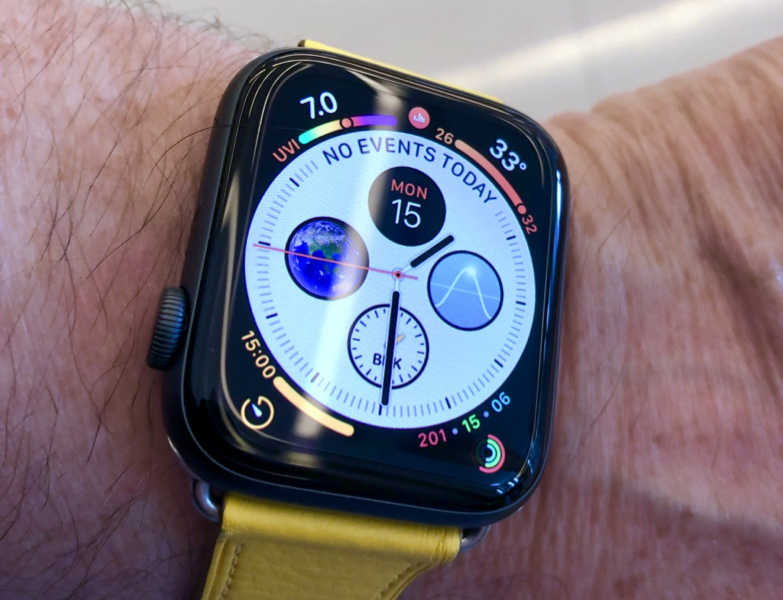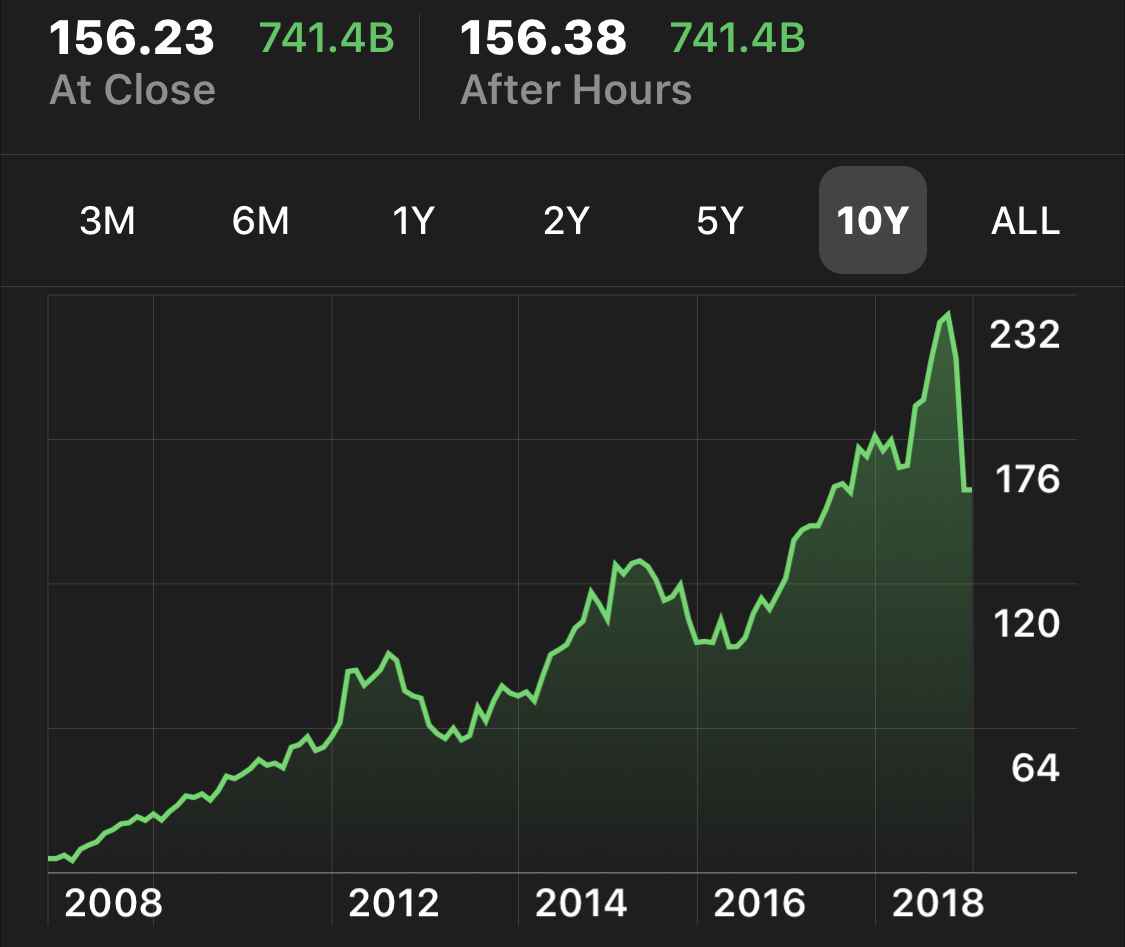
|
Cassandra - Apple End of Year: Tilting at Windmills (Updated)
By Graham K. Rogers

Apple share prices have dropped in the last few months, but so have the Dow Jones and NASDAQ indexes. Analysts focussing on Apple are being wary, but the doom-laden comments of Trip Chowdhry have a special place in the league of naysayers after his 60-day warning on the Apple Watch a while back. Now he's back.
Update
At the beginning of the new year Apple made a rare change to its guidance which was between $89 billion and $93 billion, but has now been reduced to $84 billion. This is mainly due to lower than expected iPhone sales, most notably in China. Unusually, trading in Apple shares was stopped for a while but later resumed and are currently shown at $157.92 (valuation $749.4 billion). Note my end comments concerning the lack of input from Chowdhry about China.
A couple of days ago I saw a Tweet from Philip Elmer-DeWitt mentioning Trip Chowdhry's warning of impending doom for Apple. Some may remember this famous (or infamous) analyst from another warning of doom over the Apple Watch a few years back: if this did not appear in 60 days, well, that was it. It didn't - not immediately - but I am now on the Apple Watch 4 and Apple is still here, at least for the time being.

I was not able to read that item at the time as it was behind a paywall, but at the end of the year, as part of a wider look at what seem to be troubled times for Apple, I did a search, using "Trip Chowdhry+doom" as parameters. Plenty of links came up, although not all from the famous analyst. There it all was, though, Doom, Fail, iPhone success means failure (MarketWatch, I kid you not), No innovation, as we have all been reading for several years now. One of the articles reported that Apple was to cut iPhone 6s production by 30%. I checked the dates and Google had served me up several pages from 2016, with one from 2014. Plus ça change.
Apple started this year with record figures. Its Q4 2018 report on 2 October 2018 was high, but there were two items that have caused much anguish. Like other companies, Apple announced it was no longer going to report unit sales figures. The analysts were aghast: they would have to do their own research. Even with the figures some of them often made wild guesstimates of Apple's performance, penalising Apple when the company failed to meet these fictional numbers. What would they do now? The short answer seems to be keep on making it up as we go on.
The other comment (which I bet Tim Cook now wishes he had not said, or phrased in a different way) was that, as the new Xs and Xs Plus iPhones had been released slightly early and some sales were included in Q4 2018, sales were probably going to be lower in the next quarter: Q1 2019. I expect these figures will be announced around 28 January. Apple has already factored in the sales with its guidance of between $89 billion and $93 billion, but analysts tend to ignore that: what does Apple know? What was missing from that comment on figures was that the iPhone XR had yet to appear: doing quite well apparently.
Within days, the analyst Ming-Chi Kuo, who for some reason many think is always right on Apple, reported supply chain adjustments. Downwards of course: never up. Tim Cook and others have often warned about making predictions from the supply chain as sometimes they may miss other sources that Apple accesses, and in other countries. However, as Cook had implied reductions, this was hardly a surprise. The shares began to fall. They usually do after a quarterly announcement, and a note from Ming-Chi Kuo never helps. Several other analysts jumped on the same bandwagon and down they went from a high of $232.07 on 2 October, to $156.23 at year end (the price actually hit $146.60 on 24 Dec).
There is some context here that many of the analysts commenting on Apple gloss over. Note that the Dow Jones Industrial Average gained 25% in 2017, but fell 14% from its high on 3 October 2018 (Barron's, Ben Levisohn). NASDAQ was hovering around 8,000 points from the end of August, through September and on 2 October (the same day as Q4 2018) was 8025, then fell. It would be an error of judgement to claim Apple's share price was not affected by general market (Dow and NASDAQ) sentiments.
Let me add one other metric that has a personal note. I attended the announcement of the iPhone in January 2007 and my Apple handler (now moved on to other things) was delighted that his Apple shares had moved beyond $200 while we were in San Francisco. Since that time, there has been a 7 for 1 share split, so the current price ($156.23) is an equivalent $1093.61. A look at the 10-year chart shows a significant upward gradient overall with two sharp drops followed by a recovery.

After my revealing failure with Google Search, I went to Philip Elmer-DeWitt's Apple 3.0 site. Thankfully there is no longer a paywall for this article, so the advice from Chowdhry (along with comments from Elmer-DeWitt) is now available and reads like a menu for a failing company. There are some, like Chowdhry who seem only able to be negative on Apple, for example Michael Blair, who used to appear on Seeking Alpha. He allowed his bias for non-Apple products to color his views. Many of the comments posted at the end of his texts, which often included cherry-picked statistics, thanked him for the advice to sell, as this was a signal for them to buy.
There are several questionable comments which appear with little or no support and appear to be based on opinion. I will however agree about the difficulties with app discovery on the "Apple Store" (sic), by which he may mean either the iTunes App Store, or the App Store for macOS users. Does Chowdhry research his subject? This is sloppy. One comment is worth highlighting: citing the lack of innovation (which he has mentioned in the past) he expresses concern that Apple has relied on on a single product (with upgrades) for so long, which is proof of stasis (ergo stagnation, leading to doom).
Like other smartphone makers, some of whom sell more devices, although may not make the same profits (which Chowdhry seems to object to), the product has been ibn continuous development throughout its life and should not be assessed as a single device. Several developments (64-bit OS, Fingerprint IS, Face recognition) have caught those other handset makers on the hop. Their attempts at copying the concepts have not always met with the same degrees of success. Every iPhone model produced has seen advances over the model it supersedes. Although some see the "S years" as treading water, these models have included improvements in processor feartures and camera technology.
Chowdhry's generalized focus on the share price as the most important measure of success misses one critical problem, while also failing to comment on international sales (China, India, Europe). There is no mention of the disagreements between Apple and Qualcomm which has been widely reported in news sources. Litigation recently caused sales of some models to be blocked in China (and Germany) although Apple claimed an iOS update circumvented the problem area. Qualcomm disagreed with this. There will be more litigation to follow. Although Apple is its main focus, Qualcomm is in conflict over selective pricing with certain governments across the globe, as well as a number of corporations. It is one of the rare fights for which Samsung has signed up alongside Apple. The necessary chips are now being bought by Apple from Intel and other sources.
There is also no mention of other projects, like the long-anticipated Apple Car (Project Titan), for which Apple is still hiring new personnel. Rather than have a product road map, Apple would rather avoid the Osborne Effect, which so haunted Steve Jobs that pre-announcing product lineups is still of concern at Apple. [As an aside, the English Department of Illinois State University had an Osborne 1 when I studied there in the mid-1980s.]
Instead Apple has solid lines of computers (notebook, desktop), and handheld devices (iPhone, iPad, iPad Pro). There is room for some consolidation with regard to notebook computers, and expansion of the Mac Pro computer lines. But why spoil what works (in general terms) for a Chowdhry splash? Apple has always preferred evolution of a trusted range of products, with the occasional revolutionary introduction. These are unlikely to be annual events.
Every so often Apple is criticised over its approach to business, while others seem to have a free pass. An example from a few years back, which is still mentioned, was the New York Times report on worker conditions at Foxconn factories in China, partly based on input from the since-discredited Mike Daisey. While practices at some of the factories and suppliers were not up to Western standards, other manufacturers (e.g. Dell, HP, Microsoft) also using the same factories were not put through the mill in the same way. Although not its direct responsibility, Apple applied pressure on suppliers and conditions were improved.
Likewise, Apple has improved its ecological approach with regard to materials used: a long-term approach. The wakeup call came after a demonstration by Greenpeace at the time of that 2007 iPhone announcement, although the diesel generators used to power projectors outside the Stockton Street Apple store did weaken the case that Greenpeace tried to present. There has been considerable headway made in selection of sources for raw materials, such as cobalt.
Few companies map the path of materials in their products as far back as the smelter. Apple maps many materials, including conflict minerals, back to the smelter and goes even further with others - tracking some, like cobalt, all the way back to the source.
Despite the negatives of Chowdhry (Elmer-DeWitt comments, "I usually ignore Trip Chowdhry's hyperbolic missives. . .") and others who seem intent on taking down the share price of Apple, the corporation - with its massive cash reserves - is doing well and it would be wrong to link the share price to the overall health of the company.
The analyst short-sightedly ignores (or is unaware of) the background work that is constantly underway, some of which may not see the light of day for several years (some never), and may not be in the public sphere: for example improvements in industrial processes that make manufacturing more efficient (and hence more profitable or safer). With WWDC only 6 months away, work on new versions of iOS, macOS and WatchOS are underway. These will integrate with the next versions of the hardware. Apple is not complacent, or inert, and it is irresponsible to suggest that it is.
Doomed? Well, we all are. Just not yet.
Graham K. Rogers teaches at the Faculty of Engineering, Mahidol University in Thailand. He wrote in the Bangkok Post, Database supplement on IT subjects. For the last seven years of Database he wrote a column on Apple and Macs. After 3 years writing a column in the Life supplement, he is now no longer associated with the Bangkok Post. He can be followed on Twitter (@extensions_th)
|

|




